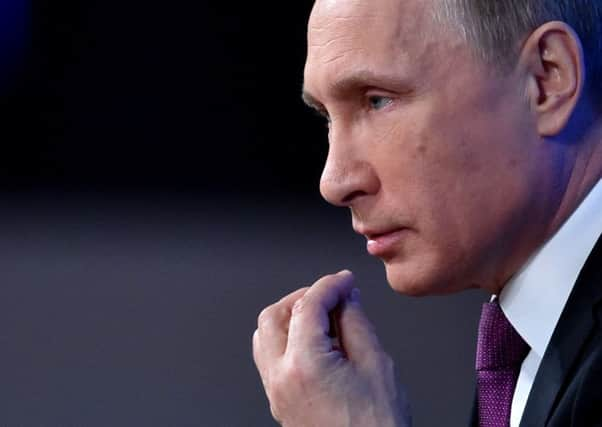Putin vows to work with West to tackle IS


In a wide-ranging interview, Putin blamed the US for ignoring Russia’s interests and trying to enforce its will on others, but he also sent conciliatory signals, saying that Moscow wants a quick settlement to the Iranian nuclear standoff and a peaceful political transition in Syria.
Speaking at a major economic forum, Putin also insisted that Russia wants February’s Ukraine peace agreement to succeed.
Advertisement
Hide AdAdvertisement
Hide AdFighting there will stop, he said, once Ukraine provides broader rights to its eastern regions, gives amnesty to the rebels and calls local elections there.
The annual event, intended to burnish Russia’s image before global investors, was tarnished by the freezing of Russian accounts in France and Belgium on Thursday as part of an effort to enforce a $50 billion (£31bn) judgment to compensate shareholders of the now-defunct Yukos oil company.
But Putin sought to downplay the freeze and said Russia will contest it. He argued that the arbitration court in The Hague, Netherlands, which issued the ruling last year, does not have jurisdiction over Russia.
The court ruled that Russia must pay damages to shareholders in the oil company, which was dismantled in a politically driven onslaught that saw its chief executive, Mikhail Khodorkovsky, sentenced to ten years in prison.
EU and US sanctions over Ukraine have helped push Russia’s economy into recession and cut investment and imports dramatically. Putin, however, argued that the Russian economy is on the path to recovery and that the West hurt itself by imposing the sanctions.
Asked about the downing of a Malaysia Airlines plane over eastern Ukraine last July that killed all 298 people on board and triggered the toughening of Western sanctions, Putin said it was necessary to wait for the conclusions of the Dutch Safety Board, which is investigating the crash.
Controversy continues over who downed the airliner. Ukraine and the West suspect it was destroyed by a Russian surface-to-air missile fired by Russian soldiers or Russia-backed separatist rebels fighting in the area which Russia denies.
Putin referred to an unofficial report alleging that the damage to the Malaysian airliner could have been inflicted by a missile launched from the area held by Ukrainian forces at the time.
Advertisement
Hide AdAdvertisement
Hide AdPutin’s speech on the economy decidedly lacked any engagement on his part or specific proposals to turn around the economy.
A large number of Russian and foreign investors in the audience were reading news or emails on their smartphones as Putin delivered a speech in which he did not address the severe crisis that businesses in Russia are facing.
In contrast to the economy speech, Putin was much more animated while responding to questions about foreign policy.
His emphasis on foreign policy has reflected the way the Kremlin has been running Russia since the Ukrainian conflict began.
Critics have blamed Putin for sacrificing the country’s economic growth for geopolitical ends, such as the 2014 annexation of Crimea.
David Iakobashvili, founder of Russia’s once-largest beverage company and head of a Russia-US business council, said businessmen had become used to the fact that Putin seems to prioritise foreign policy goals over domestic development. He added: “It’s very clear today that geopolitics is more important from his point of view.
“But we shall adapt to whatever environment has been presented by the government and act accordingly.”
Addressing the forum, Putin argued that Russia wants February’s peace deal for Ukraine to succeed. He said Russia was exerting pressure on the rebels to abide by the agreement and urged the US to encourage Kiev to comply.
Advertisement
Hide AdAdvertisement
Hide AdUkraine and the West have accused Russia of breaking the peace deal by supporting the rebels with troops and weapons. Moscow denies this.
Commenting on the accusations, Putin said the rebels are defending themselves against the Ukrainian military. He added that “once an attempt is made to solve the problem by political means, those weapons will be gone”.
In Washington, a state department spokesman called on Russia to fully implement February’s ceasefire agreement in Ukraine and remove heavy weapons from the country.
As for Putin linking the arms to a political solution, the spokesman said it was “difficult to have a political solution when you’ve still got thousands of combined Russian separatist forces inside Ukraine fomenting violence and instability, and violating the agreement that they signed up to”.
Putin used the investment conference as yet another opportunity to blame the US and the European Union for triggering the Ukrainian crisis by refusing to take into account what he described as Russia’s legitimate interests.
“They have pushed us back to the line beyond which we can’t retreat,” he said.
“Russia isn’t seeking hegemony or some ephemeral superpower status.”
Putin said Russia wants to co-operate with the West in tackling global threats and challenges, including IS, calling the extremist group an “absolute evil” that requires stronger joint efforts to combat.
Advertisement
Hide AdAdvertisement
Hide AdPutin also said Russia wants a deal ending the standoff over the Iranian nuclear program to be signed as planned before the end of June, but cautioned against putting “unfulfillable” demands upon Tehran.
And he also voiced readiness to encourage Syrian president Bashar al-Assad to discuss the peaceful political transition. He explained Moscow’s backing for the Syrian ruler was to prevent the victory of radical forces who would begin a reign of terror.
“We are ready to work with the president to ensure political transformation, so that all Syrians have access to instruments of power,” he said.